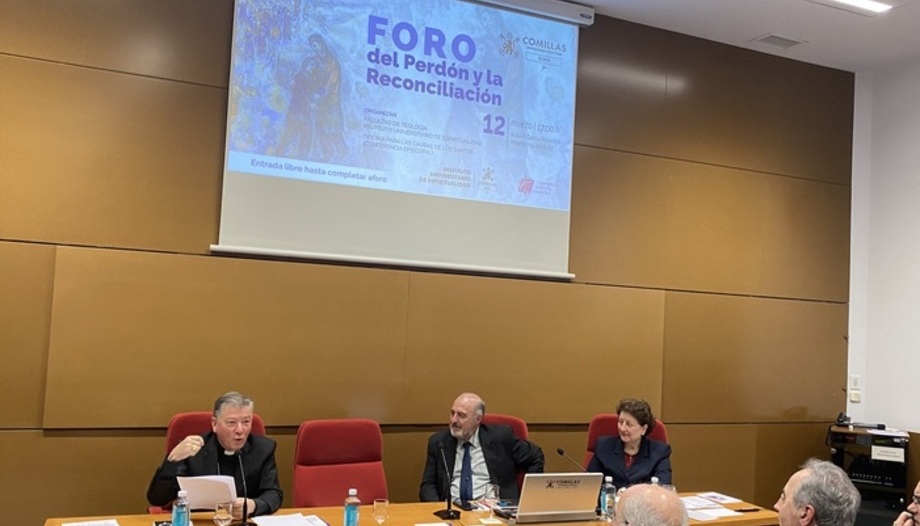The Forum for Dialogue and Study on Forgiveness and Reconciliation, which began this week in Madrid, provided a wealth of impressive testimonies of martyrs of the religious persecution of the 20th century in Spain, given by practically all the speakers.
This new Forum is a joint initiative of the Office for the Causes of Saints of the Spanish Bishops' Conference (CEE), and of the Institute of Spirituality of the Pontifical University of Comillas.
A coordinating team has been formed by Lourdes Grosso M. Id., director of the Episcopal Office; Fernando Millán, director of the Institute of Spirituality of the University of Comillas; Fernando del Moral, assistant director of the Episcopal Office; and Jorge López Teulón, postulator of important causes for the beatification of martyrs in Spain.
3,280 causes of martyrs under study
After the opening remarks by Fernando Millán and Francisco Ramírez, dean of the Faculty of Theology and Canon Law at the Pontifical University of Comillas, Lourdes Grosso reported that the Church is studying more than 3,200 causes for the beatification of martyrs of the 20th century in Spain, and that of the estimated 10,000 martyrs, 2,128 have already been beatified and eleven canonized.
"This is an immense wealth unknown to many Spaniards," said Lourdes Grosso, who stressed "the evangelizing role of the saints," and the fact that "forgiveness and reconciliation is what is proper to the Christian."
In his speech on "The gift of forgiveness as a path to reconciliation", Bishop Martinez Camino said that "in the twentieth century there have been more martyrs than in all previous centuries", so it can be called "the century of martyrs", which in a low estimate is placed at three million (in the world), and some estimate up to 50 million, because only the Armenians were one and a half million.
"Heroes of Forgiveness for Reconciliation."
In his words, Martinez Camino cited some testimonies of forgiveness, because "Christ died forgiving on the Cross", and "the martyrs are heroes of forgiveness for reconciliation", because "they died forgiving those who took their lives".
Hugo had a couple of reflections that perhaps attracted more attention. In the first, speaking of the 20th century, he said that "divine omnipotence has manifested itself more in forgiveness and mercy than in creation".
The second has to do with the meaning of forgiveness, and with the question of whether one can forgive without being complicit in evil, an issue raised by Vladimir Jankelevitch, among others. Some have gone so far as to say that "forgiveness has died in the death camps", referring to the Nazi horrors, and to the perception that human beings are capable of "radical evil".
"They died forgiving."
"There have never been more victims in all of history," added Martinez Camino, recalling similar words of Pope Francis, so it can be affirmed, with words of Scripture, that "where sin abounded, grace abounded much more," and it was perhaps the era in which "the power of God has shone the brightest."
"No century has been more violent," Martinez Camino noted. "Never have human beings killed so much. And in the martyrs, divine Providence made itself present." "The martyrs embody a premeditated forgiveness and not at the last minute." Among other testimonies, Camino recalled the Claretian martyrs of Barbastro, the Piarists, the Oblates, and so many who "died forgiving".
Within the framework of the Forumthe General Director of Publications of the EEC, Manuel Fanjul, presented the book "609 martyrs of the 20th century in Spain. Who they are and where they come from", volume four of the collection. María Ángeles Infante, HC, vice-postulator, who highlighted some of the testimonies of the martyrs. "60 Martyrs of the Vincentian Family". and the director of the diocesan secretariat for the Causes of the Saints of Cordoba, Miguel Varona, who referred to those known as 127 martyrs of Cordoba.
"Artisans of peace are needed"
The coordinating team, mentioned at the beginning, draws its inspiration from the words of Pope Francis in the Exhortation Fratelli tuttiIn many parts of the world there is a need for paths of peace that lead to the healing of wounds, for artisans of peace ready to generate processes of healing and reunion with ingenuity and audacity (...). It is necessary to learn to cultivate a penitential memory, capable of assuming the past in order to liberate the future from one's own dissatisfactions, confusions or projections. Only from the historical truth of the facts will they be able to make the persevering and long effort to understand each other and to attempt a new synthesis for the good of all" (225 and 226).
Among these "artisans of peace," witnesses of faith and forgiveness, "we recognize in a primary way the saints and blessed martyrs of the religious persecution of the 20th century in Spain," the Office for the Causes of Saints points out. And they add that through annual meetings, forums for reflection, publications, etc., they wish "to generate that penitential memory of which the Pope speaks, making known the rich heritage that we have in our martyrs, although not only. With this day we are launching a forum that will be consolidated over time.









